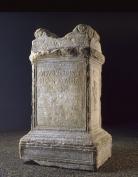Altar of Tutela at Bordeaux
This altar is the first to officially mention the name of the inhabitants of Bordeaux during the Roman period, the Bituriges Vivisques. In that period, Burdigala was one of the twenty-one cities of Aquitaine and one of the sixty cities of the Three Gauls recognised by Augustus; it was perhaps not yet the capital of Aquitaine.
The text inscribed on the altar, a dedication to the reigning emperor and to the Genius of the city of the Bituriges Vivisques, made this altar famous throughout Europe in 1534. Its decoration is equally remarkable, a crown of oak of exceptional quality in the background, and libation utensils on either side of the altar. The ewer on the left and patera to the right, ornamented by a winged genius, were accessories linked to the sacrificial ceremony in honour of the emperor and the genius of the city, enabling the priest to pour the wine and the animal viscerae over the hearth situated on the top.
The processions and ceremonies ensured the religious cohesion of the city. The altar must have been located on the forum of Bordeaux. This public space, bordered by official buildings and adorned with honorific representations, constituted the administrative centre of the city.
Every year, important people from the city gathered before this altar to commemorate the city's foundation and to offer wine and sacrifices to the two protective genii of the nation and the city. The importance of this altar has made it the cornerstone of Bordeaux's history. For this reason, it was the very first item officially preserved, exhibited in the town hall from the late 16th century, then becoming a founding item for the town's Museum of Antiquities in 1781, and thus that of today's Museum of Aquitaine.
Two lines of text seem to have been effaced at a later date. The text that can today be read is: AVGVSTO SACRVM / ET GENIO CIVITATIS / BIT(VRICVM) .VIV(ISCORVM) .
"Dedicated to Augustus and to the Genius of the city of the Bituriges Vivisques".












